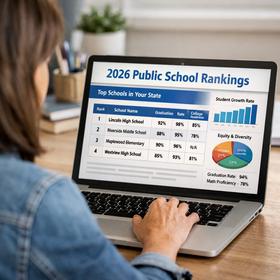Serving 525 students in grades Prekindergarten-5, Heritage Elementary School ranks in the bottom 50% of all schools in Georgia for overall test scores (math proficiency is bottom 50%, and reading proficiency is bottom 50%).
The percentage of students achieving proficiency in math is 29% (which is lower than the Georgia state average of 39%). The percentage of students achieving proficiency in reading/language arts is 29% (which is lower than the Georgia state average of 40%).
The student-teacher ratio of 14:1 is equal to the Georgia state level of 14:1.
Minority enrollment is 82% of the student body (majority Black), which is higher than the Georgia state average of 65% (majority Black).
Quick Facts (2026)
- Grades: Prekindergarten-5
- Enrollment: 525 students
- Student-Teacher Ratio: 14:1
- Minority Enrollment: 82%
- Overall Testing Rank: Bottom 50% in GA
- Math Proficiency: 29% (Btm 50%)
- Reading Proficiency: 29% (Btm 50%)
- Science Proficiency: 35-39% (Top 50%)
- Source: National Center for Education Statistics (NCES), GA Dept. of Education
Top Rankings
Heritage Elementary School ranks among the top 20% of public schools in Georgia for:
Category
Attribute
Percent Eligible For Free Lunch
School Overview
Heritage Elementary School's student population of 525 students has declined by 12% over five school years.
The teacher population of 38 teachers has declined by 9% over five school years.
Grades Offered
Grades Prekindergarten-5
(No virtual instruction)
(No virtual instruction)
Total Students
525 students
Gender %
Total Classroom Teachers
38 teachers
School Calendar
School Rankings
Heritage Elementary School ranks within the bottom 50% of all 2,192 schools in Georgia (based off of combined math and reading proficiency testing data).
The diversity score of Heritage Elementary School is 0.50, which is less than the diversity score at state average of 0.71. The school's diversity has stayed relatively flat over five school years.
Overall Testing Rank
#1374 out of 2192 schools
(Bottom 50%)
(Bottom 50%)
Math Test Scores (% Proficient)
29%
39%
Reading/Language Arts Test Scores (% Proficient)
29%
40%
Science Test Scores (% Proficient)
35-39%
40%
Student-Teacher Ratio
14:1
14:1
American Indian
1%
n/a
Asian
2%
5%
Hispanic
5%
19%
Black
68%
36%
White
18%
35%
Hawaiian
n/a
n/a
Two or more races
6%
5%
All Ethnic Groups
Participates in the National School Lunch Program (NSLP)
Yes
Eligible for Free Lunch
52%
59%
Eligible for Reduced Lunch (13-14)
6%
6%
School Statewide Testing
School District Name
Source: National Center for Education Statistics (NCES), GA Dept. of Education
Frequently Asked Questions
What is Heritage Elementary School's ranking?
Heritage Elementary School is ranked #1374 out of 2,192 schools, which ranks it among the bottom 50% of public schools in Georgia.
What schools are Heritage Elementary School often compared to?
Heritage Elementary Schoolis often viewed alongside schools like Carter Elementary School, Springdale Elementary School by visitors of our site.
What percent of students have achieved state testing proficiency in math and reading?
29% of students have achieved math proficiency (compared to the 39% GA state average), while 29% of students have achieved reading proficiency (compared to the 40% GA state average).
How many students attend Heritage Elementary School?
525 students attend Heritage Elementary School.
What is the racial composition of the student body?
68% of Heritage Elementary School students are Black, 18% of students are White, 6% of students are Two or more races, 5% of students are Hispanic, 2% of students are Asian, and 1% of students are American Indian.
What is the student-teacher ratio of Heritage Elementary School?
Heritage Elementary School has a student ration of 14:1, which is equal to the Georgia state average of 14:1.
What grades does Heritage Elementary School offer ?
Heritage Elementary School offers enrollment in grades Prekindergarten-5 (No virtual instruction).
What school district is Heritage Elementary School part of?
Heritage Elementary School is part of Bibb County School District.
School Reviews
Review Heritage Elementary School. Reviews should be a few sentences in length. Please include any comments on:
- Quality of academic programs, teachers, and facilities
- Availability of music, art, sports and other extracurricular activities
Recent Articles

Public School Rankings: Are They Accurate in 2026?
Are public school rankings accurate? Learn how rankings are calculated in 2026, what they miss, and how families can evaluate schools wisely.

How Are U.S. Public Schools Doing in 2026?
A 2026 update on how U.S. public schools are performing academically, financially, and socially in a post-pandemic era.

Helping Your Child Navigate Friendship Drama at School
Meta Description: Practical 2026 strategies for helping your child navigate friendship drama at school with confidence, empathy, and resilience.





